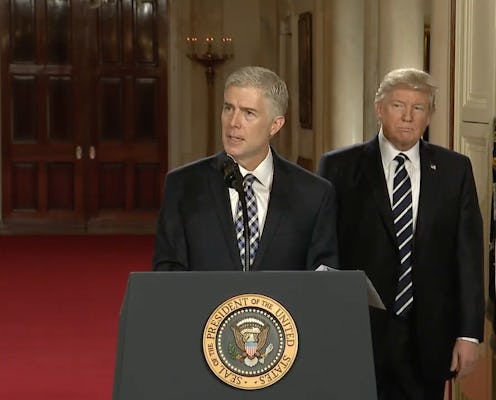News
Trump's Pick May Face A Bumpy Road

It's been nearly a year since Supreme Court Justice Antonin Scalia died in his sleep. Because of the majority Republican Congress, President Obama was repeatedly blocked from replacing him and his nominee, Merrick Garland, was never confirmed. Now that we finally know Donald Trump's nominee, how long will Gorsuch be considered for the Supreme Court before being officially confirmed into the position?
Well, in order to properly answer that question, it's important to clarify the process of nominating and appointing a Supreme Court justice. Basically, what is still required in order for Gorsuch to be confirmed into the Supreme Court is a series of hearings in front of the Senate Judiciary Committee, followed by a vote by the committee. In order for Trump's Supreme Court nominee to be confirmed, he needs at least 60 votes in the Senate.
However, Supreme Court nominees can be filibustered. On Monday, Sen. Jeff Merkley of Oregon confirmed that Democrats plan to filibuster Trump's nominee. As a result, Trump's Supreme Court pick may be facing a bumpy road to the bench and the process may prove to be more drawn out than normally expected.
In an interview with POLITICO on Monday, Merkley alluded to the majority Republican Senate's blocking of Obama's Supreme Court pick as fuel for the possible filibuster by Senate Democrats. Specifically, he said:
This is a stolen seat. This is the first time a Senate majority has stolen a seat. We will use every lever in our power to stop this.
On the other side of the aisle, Republicans have anticipated the backlash to Trump's nominee from Democrats before he was even officially announced. In advance of the formal nomination, White House press secretary Sean Spicer expressed his disapproval, saying:
Before they've [Democrats] even heard who this individual is, you've got some of them saying, absolutely no. The default used to be, unless qualified, confirmed. And it is now going to, always no. And I think that's a pretty sad message.
Of course, Spicer's statement lamenting the possibility of Democrats opposing the confirmation of Trump's nominee for the Supreme Court blatantly ignores the timeline of events following the death of Scalia.
After he passed in February 2016, Obama appointed Garland as his Supreme Court nominee. However, through months of waiting, Garland was never confirmed due to the fact that Senate Republicans continued a blockade against his nomination.
So really, if Trump's nominee receives the same, or similar treatment, Democrats could certainly argue it's just the golden rule in action.